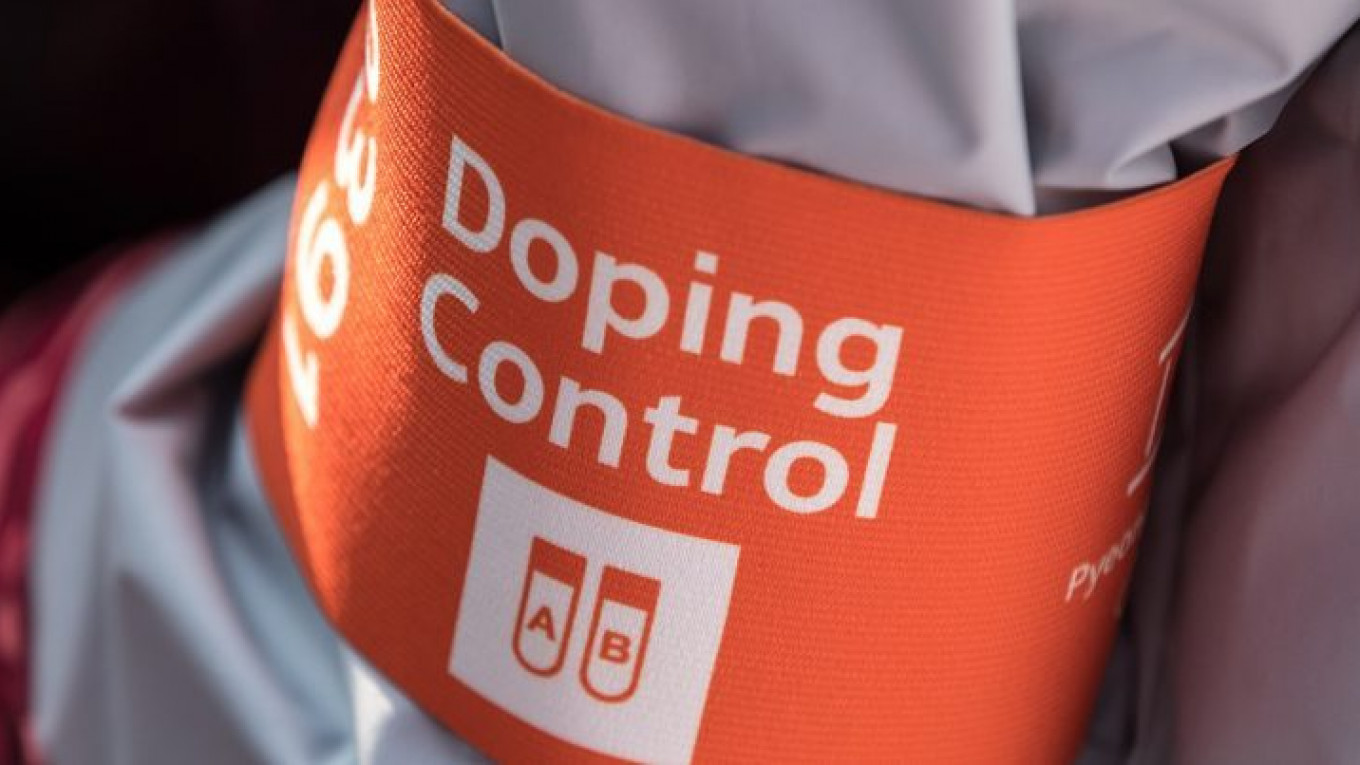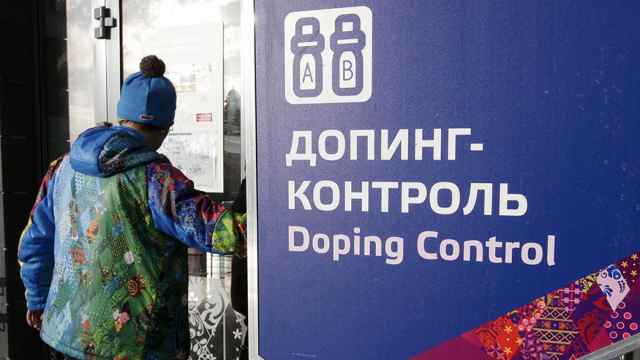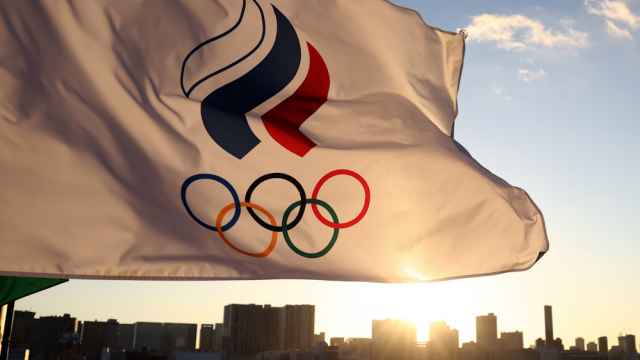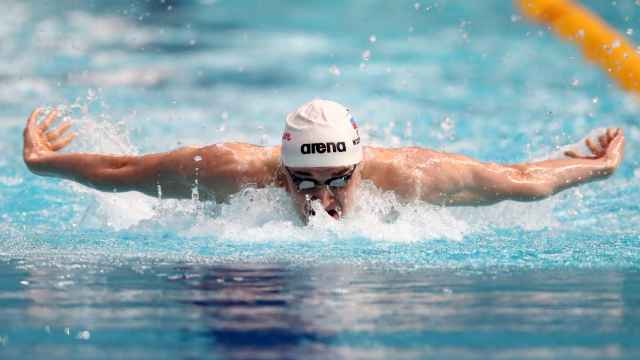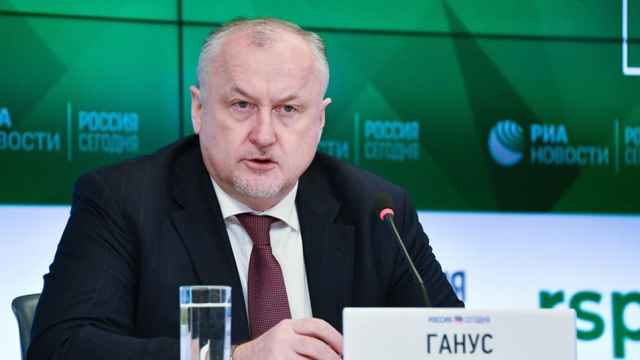Three years ago, Russian athletics coach Vladimir Mokhnev was banned for 10 years by the Court of Arbitration for Sport, global sport's over-arching judicial body, for giving prohibited performance-enhancing drugs to members of the national track team.
Mokhnev, the court ruled, had violated international anti-doping rules. His name was taken off Russia's national team roster and added to a list of banned personnel compiled by the World Anti-Doping Agency (WADA).
"I was banned," Mokhnev, who denied his involvement in doping, said at a news conference on June 23, 2017. "How can I work?"
On May 16 this year, a Reuters reporter witnessed Mokhnev at an athletics stadium in the city of Kursk giving instructions to seven runners, recording their lap times from the side of the track and at one point coming out onto the track during a warm-up to give directions to an athlete.
WADA's World Anti-Doping Code — which all signatories including Russia commit to abide by — states that banned coaches and other athlete support staff are not allowed to "participate in any capacity" in a competition or in activities related to elite sport.
Athletes also must not receive training, strategy, nutritional or medical advice from banned coaches or medical staff and can face sanctions if they do, according to the code.
However, it is not legally binding under Russian criminal or administrative law.
The IAAF, global athletics' governing body, meets this weekend in Monaco where it will discuss the status of Russia's athletics federation. The body which oversees track and field in the country has been suspended since 2015 after a probe ordered by WADA found evidence of widespread doping.
Russian agency to investigate findings
Despite the restrictions, Mokhnev and a second athletics coach, also serving a ban for doping, remain involved in coaching, Reuters has found.
Russia's athletics federation announced that the other coach, Valery Volkov, had received a four-year ban for an anti-doping violation effective from August 2017. He was added to the WADA list of banned personnel.
In addition, Sergei Portugalov, formerly the athletics federation's chief medical officer, was banned for life by the Court of Arbitration for Sport in 2017 for doping violations.
Reuters found that, since then, he has given nutrition and training advice in lectures at a Moscow gym.
When asked by Reuters about these activities, none of the individuals, nor the sports bodies overseeing their bans, produced any evidence that there were exceptions to the bans that apply to them.
Contacted by Reuters by telephone, Mokhnev said his ban was unjust. He said he was sometimes asked by coaches to drive athletes to meets, and, once there, sat and watched.
"I can go where I want," he said. "I can go up to whomever I want. Or am I a leper? Show me a law that I have violated, a Russian law."
Responding to Reuters questions via his institute's press service, Volkov said he was aware of the ban but was holding physical education classes and not training professional athletes.
Portugalov did not respond to requests for comment.
WADA said it would follow up with Russian anti-doping agency RUSADA and "the relevant international federations" that have jurisdiction over the individuals to ensure they were aware of the Reuters findings and that "the allegations are being dealt with appropriately."
Yuri Ganus, the director of RUSADA, told Reuters it would investigate the findings.
Russia's athletics federation said the findings made by Reuters had been sent to RUSADA because they contained "information on possible anti-doping violations."
The federation said it had called on RUSADA and the sports minister of the Kursk region to investigate Mokhnev's work with athletes and, if the Reuters findings were confirmed, to "hold those guilty responsible."
The International Association of Athletics Federations (IAAF) did not respond to a request for comment.
Blow to Russian prestige
In November 2015, Russia's athletics federation and RUSADA were suspended over what Dick Pound, who presided over a WADA-commissioned report into doping in Russian athletics, called state-sponsored doping.
It was a major setback for a nation with a proud history of global success in track and field and beyond.
Russia says it has turned over a new leaf and is seeking to retrieve its status as a full-fledged participant in international sport.
Some critics, including former and current anti-doping officials and a former world-class athlete contacted by Reuters, counter that Russia has not truly changed its ways.
Asked to comment on Reuters findings, Travis Tygart, CEO of the U.S. Anti-Doping Agency (USADA), a signatory to the WADA code, said: "If true, the world's clean athletes have truly been sold down the river and the Russians are laughing behind our backs."
Under the WADA code, if someone serving a ban violates it, the duration of the ban can be doubled. The code does not state what happens if the person is serving a life ban.
The WADA code establishes anti-doping regulations that must be followed and enforced by its signatories, including RUSADA.
RUSADA was suspended in 2015 after the WADA-commissioned report said it warned athletes in advance about testing and its officers accepted bribes from athletes.
WADA's Executive Committee voted last year to re-instate RUSADA, saying it had undergone reform. At the time, members of WADA's Athletes Committee dissented.
Kremlin spokesman Dmitry Peskov referred questions to the sports ministry, which did not respond.
The Athletics Integrity Unit, which oversees integrity issues in international athletics, including doping, said it did not comment on specific cases when presented with Reuters' findings.
Banned, but trackside
Mokhnev, the banned running coach, instructed Yulia Stepanova, then an 800-meter runner with the Russian national team, on how to inject herself with banned blood booster Erythropoietin (EPO), and advised her on how to avoid detection, according to the WADA-commissioned report.
In addition to his interaction with athletes in Kursk on May 16, Mokhnev was also track-side last year at athletics meets in Kursk, according to a video and photographs posted online by local athletics followers.
In a photograph that a former local athlete posted on her social media page, Mokhnev can be seen standing by the track, with a stopwatch around his neck, next to a runner called Nikolai Bukreyev.
The photograph was taken at a competition in Kursk that ran from May 17 to 18, 2018.
At another competition a few days later at the same track in Kursk, a city about 500 kilometers south of Moscow, amateur video footage shows Mokhnev on the track.
In the footage, Mokhnev, who was out of shot at that moment, can be heard shouting at Bukreyev.
"Come on, come on Kolya!" Mokhnev shouts, using the Russian diminutive for Nikolai. "Two hundred meters left, go, go! 2:03, what is that?"
Bukreyev said he would not comment on "false facts," without saying which facts he deemed false.
The head of the Kursk region's athletics federation, Yevgeny Shumakov, said Mokhnev had not been coaching but rather offering advice to athletes from the side of the track.
He said Mokhnev received no pay for working with athletes, but added that a banned coach turning up at meets was "not okay", although the federation did not have the power to stop him. "I can't handcuff him, can I?" he said.
Reuters could not confirm whether Mokhnev has received any payments for his advice.
College coach
University track coach Volkov was banned for encouraging a female athlete to refuse a doping test at a 2015 competition in Moscow, according to the Russian athletics federation.
On two occasions in September last year, Reuters witnessed him instructing runners at the outdoor track belonging to the Moscow Power Engineering Institute, a university in the Russian capital.
The institute's website described Volkov as the coach of its athletics team in October 2017, two months after his ban had taken effect. The institute later told Reuters that this was down to a mistake by its press office.
He is now listed on the website as a member of the physical education faculty, but there is no recent mention of him as coach of the university team.
During one training session, Volkov instructed a group of about 10 runners as they sprinted around the track. Reuters also witnessed him massaging an athlete's hamstrings and calves by the track.
The institute said Volkov was conducting physical education classes with students and did not have contact with professional athletes.
RUSADA head Ganus said the agency could not demand Volkov's firing because the institute is not a sports organization.
Business ties
Portugalov, formerly the athletics federation's chief medical officer, had provided athletes with banned substances and covered up their positive tests for a cut of their winnings, according to the WADA-commissioned report.
Elite athletes who receive medical or nutrition advice from banned team personnel can face sanctions, according to the WADA code.
Portugalov, who owns a 20% stake in a firm called "Klokov. Technologies of Sports Training and Recovery", offered medical advice to a group of about 20 people at a paid lecture organized by the firm at a Moscow weightlifting gym in December 2018.
He offered advice on how to monitor blood components, and what nutrition to use for optimal training.
A Reuters reporter attended the lecture.
The firm's executive director, Soviet weightlifter Vyacheslav Klokov, said Portugalov had officially retired but continued to be called upon for educational activities related to health, nutrition and illness prevention.
RUSADA's Ganus said Portugalov's lecturing did not violate anti-doping regulations because, as far as the agency is aware, he was giving his audience advice about methods and treatments that are permitted under anti-doping rules.
A Message from The Moscow Times:
Dear readers,
We are facing unprecedented challenges. Russia's Prosecutor General's Office has designated The Moscow Times as an "undesirable" organization, criminalizing our work and putting our staff at risk of prosecution. This follows our earlier unjust labeling as a "foreign agent."
These actions are direct attempts to silence independent journalism in Russia. The authorities claim our work "discredits the decisions of the Russian leadership." We see things differently: we strive to provide accurate, unbiased reporting on Russia.
We, the journalists of The Moscow Times, refuse to be silenced. But to continue our work, we need your help.
Your support, no matter how small, makes a world of difference. If you can, please support us monthly starting from just $2. It's quick to set up, and every contribution makes a significant impact.
By supporting The Moscow Times, you're defending open, independent journalism in the face of repression. Thank you for standing with us.
Remind me later.



